How is beet juice beneficial for the human body?
The healing properties of beets have been known since ancient times. Initially, only the root was used as a medicine. For many years, scientists have carefully studied the chemical composition of the vegetable and came to the conclusion that freshly squeezed beet juice also has a beneficial effect on the body. The rich content of proteins, natural antioxidants, organic acids, vitamins and mineral salts allows it to be used for the prevention and treatment of many diseases: anemia, infections, rickets, diabetes, oncology, cardiovascular pathologies, etc.
Let's consider the beneficial properties of beet juice and contraindications, for which diseases it will help and when it can harm the body, as well as medicinal recipes based on the beet drink.
Composition and healing properties
The beet genus includes about a dozen species. The most famous representatives are common beet and sugar, their benefits and harm to the body will be discussed in our article.
Such an affordable vegetable has a unique and rich chemical composition. Beet roots are saturated with carbohydrates and proteins and contain practically no fat (mass fraction per 100 g of product is 0.2 g).
Other components of the composition also have a beneficial effect on the body:
- organic acids;
- vitamins A, B, C;
- folic acid;
- betaine;
- mineral salts: potassium, calcium, magnesium, iron, iodine, zinc and others;
- cellulose.
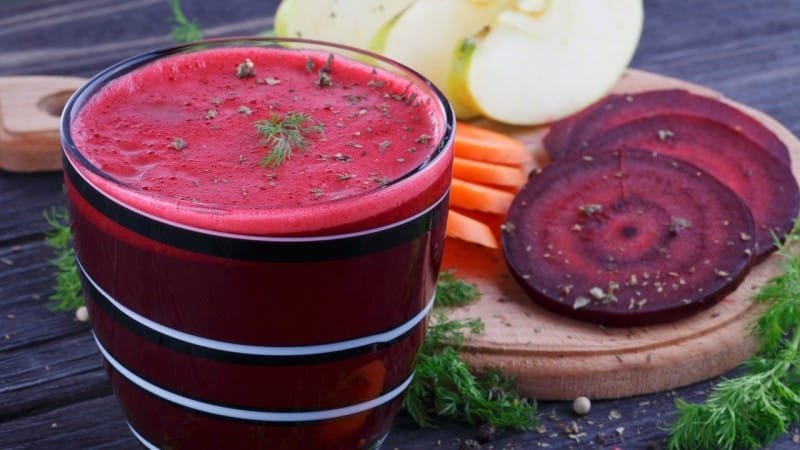
Beetroot is actively used to treat a wide range of diseases:
- antioxidants have a positive effect on the condition of blood vessels and the heart, neutralize free radicals - protect against chronic heart and liver diseases;
- The rich content of iron, cobalt, and B vitamins in the root crop allows the use of beet juice for the treatment and prevention of anemia;
- zinc and phosphorus are necessary for children with rickets: they increase bone mineralization and normalize bone formation processes;
- natural antiseptics destroy pathogenic microflora, thereby preventing the spread and proliferation of infection, cleanse the oral cavity, improve skin condition, and prevent the development of gastric and intestinal infections;
- due to the presence of organic acids and fiber in the composition, intestinal motility is stimulated, helping with spastic constipation;
- anthocyanins and betacyans inhibit the growth of cancer cells;
- has a diuretic effect: increases the excretion of excess fluid and salts, thereby reducing the fluid content in tissues and serous cavities;
- calms the nervous system, is useful for psycho-emotional fatigue, constant stress, relieves depression;
- increases the resistance of the immune system to external and internal adverse factors;
- inhibits the inflammatory process;
- accelerates the regeneration of soft tissues, has wound healing properties;
- relieves joint pain.
The healing properties of beet juice for the human body do not end there. It activates metabolic processes, saturates the body quickly and for a long time, eliminating the feeling of hunger, and normalizes weight.
The optimal balance of folic acid, zinc, potassium, magnesium and other minerals has a positive effect on the functions of the genitourinary, excretory and cardiovascular systems.
Traditional medicine advises women and men with impaired direction and severity of sexual desire to take freshly squeezed beet juice.
Reference. Since the root vegetable is enriched with folic acid, it is recommended for use by women who are planning a pregnancy, or in the first months of pregnancy.
For oncology
Malignant tumor formations are difficult to treat with medication even at an early stage and, as a rule, involve treatment with radiation and chemotherapy.
Treatment of cancer with traditional methods, including beet juice, can only worsen the course of the disease and cause its progression, followed by death. If you suspect cancer, you must seek help from a specialist who will make an accurate diagnosis and determine further treatment tactics. The outcome of the disease depends on timely diagnosis and proper treatment.
But beet juice is quite suitable for the prevention of cancer. Natural antioxidants in the root vegetable neutralize the oxidative effect of free radicals and other chemicals, protecting the body's cells from internal and external toxic damage. In addition, anthocyanins and betacyans inhibit the growth of cancer cells.
Vitamins, organic acids and mineral salts that are important for the body in the composition of the root vegetable strengthen the immune system, increasing its resistance to exogenous and endogenous irritants.
For colds
Beetroot juice is widely used as an adjuvant for the treatment of respiratory diseases. Natural antiseptics contained in the root vegetable suppress and even treat some infectious pathologies. They destroy pathogens, preventing their spread into the lower respiratory tract, and protect against chronic processes and complications.
Beets are good for coughs. It has a softening and enveloping effect on irritated mucous membranes, reduces swelling of the larynx, eliminates pain and sore throat, and reduces the frequency and intensity of coughing attacks. If the paranasal sinuses are affected, beetroot juice, diluted with water in equal proportions, is instilled into the nose. It relieves inflammation, swelling, and makes breathing easier.
Freshly squeezed beet juice is used to prevent colds, since its regular use, especially in the autumn-winter period, helps to form a mechanism of antimicrobial immunity and increase its resistance to the action of pathogenic microflora.
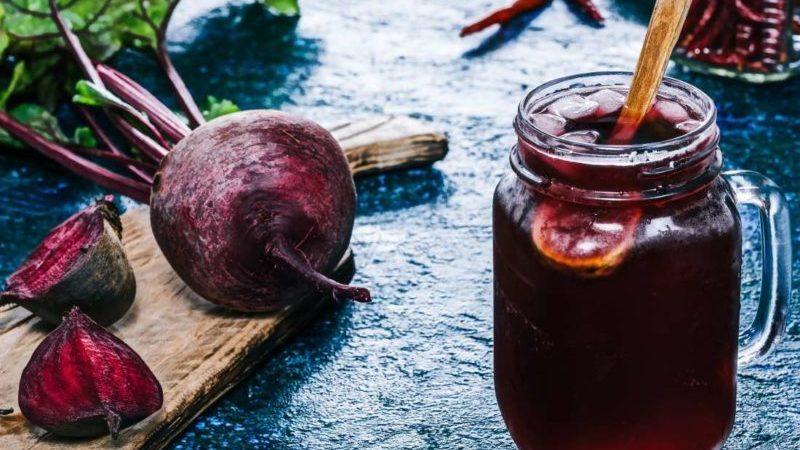
For thyroid diseases
Due to its high iodine content, beet juice is widely used in the treatment of hypothyroidism. The disease develops under conditions of triiodothyronine and thyroxine deficiency and entails metabolic disorders. Regular consumption of beet juice saturates the body with the required amount of iodine and other useful micro- and macroelements, and starts metabolic processes.
Important! Drinking beet juice is contraindicated in case of excessive activity of the thyroid gland and increased production of thyroid hormones.
Benefits and harms for the liver
Traditional medicine recommends using beet juice to maintain liver function. Root vegetables contain large quantities of betanin, which improves the absorption of protein, participates in its synthesis, triggers the work of liver cells and prevents their fatty degeneration. In addition, beets rid the body of waste and toxins and reduce the risk of stones in the gall bladder and bile ducts.
There is also a flip side to the coin. Drinking beet juice may worsen the course of urolithiasis. Oxalic acid in the root vegetable promotes the formation of urate components, and the diuretic effect provokes the movement of stones, which can cause obstruction of the ducts and renal colic. Therefore, the decision on the need to treat liver diseases with red beet juice must be made together with the attending physician, when its benefits and harms in a particular case are determined.
In addition, beets have a beneficial effect on a number of functions of the digestive tract: improves the peristalsis of the stomach and intestines, normalizes the condition of the mucous membranes, prevents the development of gastric and intestinal pathogenic microflora, cleanses the body of toxic substances, heavy metal salts, and radioactive components.
Important! Freshly squeezed beet juice is contraindicated in case of hyperacidity. gastritis, as it increases acidity and can cause increased pain and inflammation.
For blood vessels and heart diseases
Eating beets has a positive effect on the condition and function of the cardiovascular system and blood vessels. Beetroot juice is taken in the treatment of high blood pressure, anemia, atherosclerosis, and vitamin deficiency.
Drinking a vegetable drink affects a number of important body functions:
- provides better blood saturation with oxygen, hemoglobin, red blood cells;
- improves blood circulation through blood vessels;
- exhibits a sedative (calming) effect;
- stimulates the activity of the heart muscle, increases the number and strength of heart contractions;
- reduces tension in vascular walls;
- normalizes microcirculation;
- reduces the risk of blood clots;
- removes excess fluid from the body;
- reduces platelet aggregation and blood sugar levels;
- reduces the level of lipid deposition, increased concentration of uric acid.
Important! Due to the fact that the vegetable has a pronounced hypotensive effect, it is contraindicated for people with low blood pressure.
Medicinal recipes based on beet juice
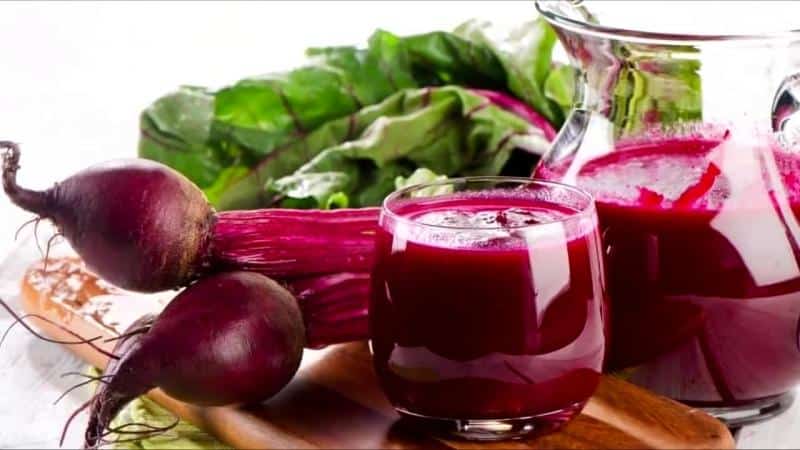
Taking into account the characteristics of the development and course of the disease, beet juice is prepared and used in different ways. So, for pathologies of the thyroid gland, heart, blood vessels, and organs of the gastrointestinal tract, beetroot syrup or juice is prepared for oral administration. For colds, it is used for rinsing; for adenoiditis and sinusitis, it is instilled into the nose.
There are several ways to make beet juice. First of all, it is important to choose the right root vegetable. It should be medium in size, purple in color, without white streaks inside, undamaged. The vegetable must be washed well under running water, the roots and tops removed, and made into a drink using a juicer.
If you don’t have a juice making device in your home, follow one of the following steps:
- Peel the vegetable, cut into small pieces, pass through a meat grinder or blender, or alternatively, grate on a coarse grater. Place the pulp in gauze or a bandage folded in several layers and squeeze out the juice.
- Do not remove the peel from the vegetable; use a knife to cut a hole in the middle and add sugar or honey inside. Place in the microwave for 5-10 minutes or oven for 15-20 minutes at 200 degrees until juice forms.
Now that the juice is ready, let's look at recipes on how to prepare and take beets for specific diseases:
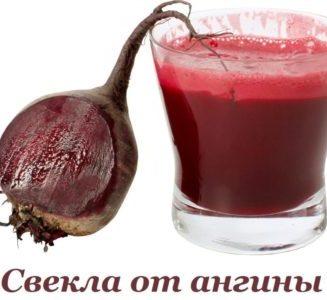
- Colds, acute respiratory viral infections, acute respiratory infections. Add 1 tbsp to freshly prepared beet juice. l. vinegar, gargle with the solution every 3-4 hours. To instill freshly squeezed beet juice into the nasal passages, you must first dilute it in half with water. Instill 1-2 drops into the cleansed nasal sinuses in the morning and evening until complete recovery, but no longer than 7-10 days. For sore throat Beetroot juice with honey works well at the rate of 1 tbsp. l. honey per glass of juice. Take orally in small portions throughout the day.
- Anemia. Combine beet juice, black radish and carrot juice in equal proportions and pour into a dark glass container. Cover the neck of the dish with dough, leaving a small hole through which moisture will evaporate. Adults are recommended to take 1 tbsp orally. l. three times a day before meals for 2.5-3 months, unless otherwise specified by the doctor.
- Avitaminosis. Drink 30-50 ml of freshly prepared beet juice per day 30 minutes before the main meal. The maximum permissible daily intake should not exceed 200 ml.
- During the rehabilitation period after a heart attack. Prepare beet juice in advance in the evening, leave overnight to settle. Next, combine with honey in equal proportions and mix well until it is completely dissolved. Take 2 tbsp orally. l. every 4 hours, but not more than 3-4 times a day.
- Hypertension. First prepare the horseradish juice.Grate the peeled root on a coarse grater, squeeze out the juice using gauze, dilute with water in a 1:1 ratio to yield 250 ml of juice. Leave for two days to infuse. Next, mix horseradish, beet and carrot juice in equal proportions, add the juice of one lemon and 250 ml of honey. Mix everything well. Drink 1 tbsp. l. 2-3 times a day an hour before meals or 1.5-2 hours after meals. The course of treatment is 60 days.
- Liver diseases. During the day, consume a vegetable mix made from equal parts of beet juice, cucumber and carrots 2-3 times. The one-time norm is 50-100 ml, the daily norm is 200-300 ml.
- Peptic ulcer of the stomach and duodenum. In a clean glass container, combine 100 ml of beet juice, radish, carrot juice, alcohol and 100 g of honey, stir until smooth. Leave for three days in a cool, dark place to infuse. Take 2 tbsp orally. l. at intervals of three times a day. Shake before use. The course of treatment is 5-7 days.
Effect of beet juice with other drinks
Beetroot juice is consumed in its pure form, but it brings more benefits in combination with other vegetable drinks. They not only improve its taste, but also enhance its medicinal properties and add new effects beneficial to the body.
Beet juice goes well with cucumber, cabbage, carrot, apple, pumpkin, orange juice, as well as celery and ginger.
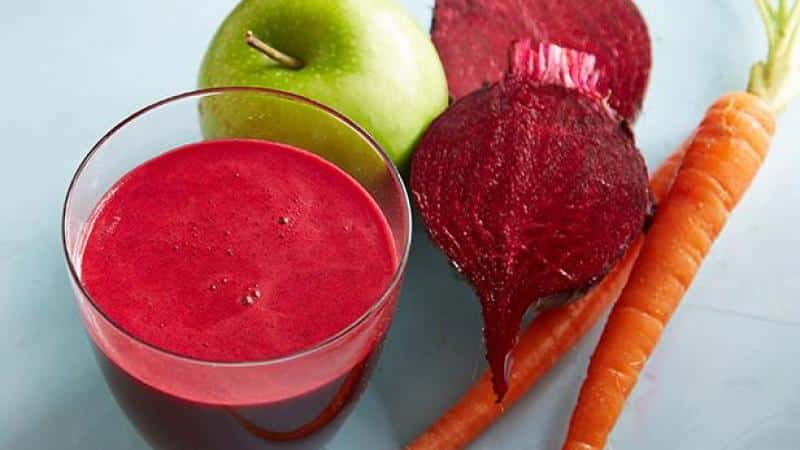
Reference. To soften the pronounced properties of beet juice and diversify its taste, honey, cranberries, and black currants are added to it.
Reviews
There is no doubt that beet juice, when consumed correctly, has a positive effect on a number of body functions. However, opinions about the medicinal properties of the root vegetable and its role in the treatment of certain diseases are varied.. It is difficult to give an accurate assessment of its effectiveness, because the result depends on the characteristics of the patient’s body and the etiology of the disease.
In addition, the root vegetable contains no substances of synthetic origin, unlike medications, so the effect of using beet juice is cumulative: it requires long-term and regular use.
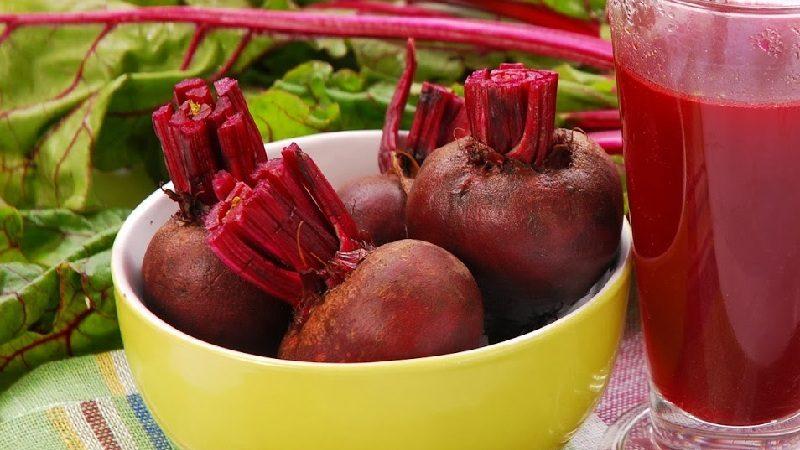
What patients say:
Olga: “I recently had a cold and had a severe paroxysmal cough. I found information on the Internet that beets help get rid of a cough. I decided to try it, it won't get any worse. Already on the second day, the coughing attacks became less frequent, the sore throat and sore throat decreased, and it became easier to swallow. I liked the result and continued the treatment. On the seventh day the cough was completely gone. Beetroot juice helped me a lot. I recommend taking note as a natural medicine.”
Matvey: “I can’t evaluate the benefits of beets in relation to other diseases, but for hypothyroidism it is completely useless. I accept it as a preventive measure, but I don’t recommend it for treatment. After a course of drug therapy, I decided to improve the condition of the thyroid gland and for a month I drank a glass of freshly squeezed beet and carrot juice a day. When I re-tested, the indicators remained at the same level. Plus, I didn’t notice any side effects, my sleep and mood improved.”
Conclusion
The benefits and harms of beet juice for the body must be assessed in the case of a particular patient, taking into account his age, gender, medical history, causes and characteristics of the course of the underlying disease. Beetroot juice is not a panacea for all diseases.It helps slow down pathological changes, has a positive effect on blood vessels and the heart, improves the condition of people suffering from thyroid diseases and chronic constipation, normalizes the functions of the excretory organs and genitourinary system, and metabolic processes.
However, in some cases, a drink made from beets turns out to be a useless medicine, as with oncology, and if you do not take into account the presence of contraindications, it can cause harm to the body. Therefore, the question of the advisability of its use for the treatment of a particular disease should be discussed with a doctor.